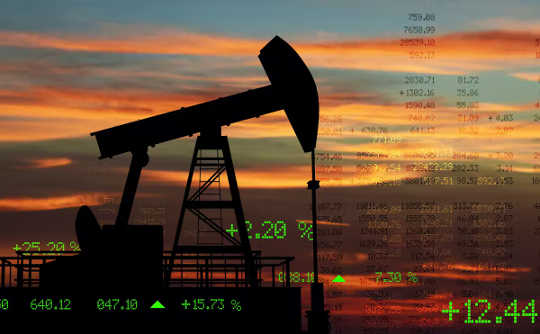
Oil prices have soared. Shutterstock/Festa
The invasion of Ukraine comes at a delicate time for the world economy, which was just beginning to recover from the ravages of COVID. Russia’s war could now have far-reaching economic consequences, as financial markets tumble and the price of oil soars.
A worrying comparison can even be made to the 1973 Yom Kippur war in the Middle East, which led to an oil crisis. This shook the world economy to its foundations and signalled the end of an economic boom which had done so much to reduce unemployment and raise living standards.
Today the world economy is much larger than it was back then, but it has been growing much more slowly in recent decades. And the pandemic struck a mighty blow over the last two years, with governments forced to spend vast sums on bailing out their own economies.
Now, despite some signs of recovery, the risks of higher inflation and lower growth remain, with large debts limiting the ability of many governments to intervene.
Key to the weakening economic outlook are rising energy costs and continuing disruption to supply chains – both of which will be made worse by the Ukraine crisis. Russia is the EU’s largest supplier of gas and oil, and higher energy costs mean more expensive transport, affecting the movement of all kinds of goods.
But perhaps the biggest risk to the world economy is that a prolonged crisis could tip the world into stagflation, a combination of high inflation and low economic growth. This was a key problem after the 1973 oil crisis, but one which many economists hoped has been consigned to history, with relatively low and stable prices for the last two decades.
Cost of living could worsen
High and rising inflation will exacerbate the cost-of-living crisis which is already affecting many consumers. It also presents a dilemma for central banks which have been pouring money into the economy for the last two years of the pandemic.
Most are now planning to gradually withdraw this support at the same time as gradually raising interest rates to curb inflation.
But this will further weaken the economy – especially if inflation continues to accelerate and central banks react with dramatic interest rates rises. During the 1970s crisis, the US Federal Reserve had raised interest rates to 10% by 1978, causing a deep recession. The following year in the UK, Bank of England interest rates reached 17%, precipitating a sharp economic decline.
Hopes that inflationary pressures will ease by the middle of 2022 now look optimistic. Russia and Ukraine are among the world’s biggest exporters of wheat and many (especially in Europe) depend on Russian oil and gas, so energy and food prices could continue to rise further.
And it’s not just the rate of inflation which matters, but also people’s expectations that it will rise further. This can spark a “wage-price spiral”, where people demand higher wages to compensate for the higher cost of living, forcing companies to increase prices further across the board to pay for the wage rises. Central banks are then forced to raise interest rates even higher.
Inflation also means that government spending could fall in real terms, reducing the level of public services and squeezing public sector pay. And if firms become concerned that they cannot raise prices enough to compensate for higher wages, they may be tempted to cut back on their workforce, leading to higher unemployment.
Falling stocks
While the central banks have been pumping huge amounts of money into financial markets in order to help stabilise a weak economy, one effect of this has been that the stock markets remained remarkably buoyant over the last decade, rising by nearly 10% each year on average.
Stocks had already started to fall this year after central banks announced that they will unwind this support, and markets have fallen further since Ukraine was attacked. If stagflation returns, central banks will have to reduce their support even faster, while a slowing economy would hit corporate profits and further depress stock prices (although energy stocks would rise). This in turn could reduce investment and business confidence, leading to fewer new jobs.
For many people who hold stocks or other assets, rising prices often lead to a “wealth effect” where people are more confident about spending (and borrowing) money, especially on big ticket items. Weaker markets would therefore affect economic growth, as well as the viability of pension plans which many people depend on.
So while there is much uncertainty about the political and human consequences of Russia’s attack on Ukraine, the world should also be prepared for serious economic ramifications.
Europe is likely to be first in the path of any economic storm, partly because of its greater dependence on Russian energy supplies, but also because of its geographical proximity to a war on its doorstep.
In the US, any economic difficulties could further weaken the Biden administration and bolster isolationist, America-first views. Meanwhile, a global alliance between Russia and China could further strengthen both economies, overriding any effect of sanctions, and strengthening their military as well as economic clout.![]()
About The Author
Steve Schifferes, Honorary Research Fellow, City Political Economy Research Centre; Professor of Financial Journalism, 2009-2017, City, University of London
This article is republished from The Conversation under a Creative Commons license. Read the original article.
Recommended books:
Capital in the Twenty-First Century
by Thomas Piketty. (Translated by Arthur Goldhammer)
 In Capital in the Twenty-First Century, Thomas Piketty analyzes a unique collection of data from twenty countries, ranging as far back as the eighteenth century, to uncover key economic and social patterns. But economic trends are not acts of God. Political action has curbed dangerous inequalities in the past, says Thomas Piketty, and may do so again. A work of extraordinary ambition, originality, and rigor, Capital in the Twenty-First Century reorients our understanding of economic history and confronts us with sobering lessons for today. His findings will transform debate and set the agenda for the next generation of thought about wealth and inequality.
In Capital in the Twenty-First Century, Thomas Piketty analyzes a unique collection of data from twenty countries, ranging as far back as the eighteenth century, to uncover key economic and social patterns. But economic trends are not acts of God. Political action has curbed dangerous inequalities in the past, says Thomas Piketty, and may do so again. A work of extraordinary ambition, originality, and rigor, Capital in the Twenty-First Century reorients our understanding of economic history and confronts us with sobering lessons for today. His findings will transform debate and set the agenda for the next generation of thought about wealth and inequality.
Click here for more info and/or to order this book on Amazon.
Nature's Fortune: How Business and Society Thrive by Investing in Nature
by Mark R. Tercek and Jonathan S. Adams.
 What is nature worth? The answer to this question—which traditionally has been framed in environmental terms—is revolutionizing the way we do business. In Nature’s Fortune, Mark Tercek, CEO of The Nature Conservancy and former investment banker, and science writer Jonathan Adams argue that nature is not only the foundation of human well-being, but also the smartest commercial investment any business or government can make. The forests, floodplains, and oyster reefs often seen simply as raw materials or as obstacles to be cleared in the name of progress are, in fact as important to our future prosperity as technology or law or business innovation. Nature’s Fortune offers an essential guide to the world’s economic—and environmental—well-being.
What is nature worth? The answer to this question—which traditionally has been framed in environmental terms—is revolutionizing the way we do business. In Nature’s Fortune, Mark Tercek, CEO of The Nature Conservancy and former investment banker, and science writer Jonathan Adams argue that nature is not only the foundation of human well-being, but also the smartest commercial investment any business or government can make. The forests, floodplains, and oyster reefs often seen simply as raw materials or as obstacles to be cleared in the name of progress are, in fact as important to our future prosperity as technology or law or business innovation. Nature’s Fortune offers an essential guide to the world’s economic—and environmental—well-being.
Click here for more info and/or to order this book on Amazon.
Beyond Outrage: What has gone wrong with our economy and our democracy, and how to fix it -- by Robert B. Reich
 In this timely book, Robert B. Reich argues that nothing good happens in Washington unless citizens are energized and organized to make sure Washington acts in the public good. The first step is to see the big picture. Beyond Outrage connects the dots, showing why the increasing share of income and wealth going to the top has hobbled jobs and growth for everyone else, undermining our democracy; caused Americans to become increasingly cynical about public life; and turned many Americans against one another. He also explains why the proposals of the “regressive right” are dead wrong and provides a clear roadmap of what must be done instead. Here’s a plan for action for everyone who cares about the future of America.
In this timely book, Robert B. Reich argues that nothing good happens in Washington unless citizens are energized and organized to make sure Washington acts in the public good. The first step is to see the big picture. Beyond Outrage connects the dots, showing why the increasing share of income and wealth going to the top has hobbled jobs and growth for everyone else, undermining our democracy; caused Americans to become increasingly cynical about public life; and turned many Americans against one another. He also explains why the proposals of the “regressive right” are dead wrong and provides a clear roadmap of what must be done instead. Here’s a plan for action for everyone who cares about the future of America.
Click here for more info or to order this book on Amazon.
This Changes Everything: Occupy Wall Street and the 99% Movement
by Sarah van Gelder and staff of YES! Magazine.
 This Changes Everything shows how the Occupy movement is shifting the way people view themselves and the world, the kind of society they believe is possible, and their own involvement in creating a society that works for the 99% rather than just the 1%. Attempts to pigeonhole this decentralized, fast-evolving movement have led to confusion and misperception. In this volume, the editors of YES! Magazine bring together voices from inside and outside the protests to convey the issues, possibilities, and personalities associated with the Occupy Wall Street movement. This book features contributions from Naomi Klein, David Korten, Rebecca Solnit, Ralph Nader, and others, as well as Occupy activists who were there from the beginning.
This Changes Everything shows how the Occupy movement is shifting the way people view themselves and the world, the kind of society they believe is possible, and their own involvement in creating a society that works for the 99% rather than just the 1%. Attempts to pigeonhole this decentralized, fast-evolving movement have led to confusion and misperception. In this volume, the editors of YES! Magazine bring together voices from inside and outside the protests to convey the issues, possibilities, and personalities associated with the Occupy Wall Street movement. This book features contributions from Naomi Klein, David Korten, Rebecca Solnit, Ralph Nader, and others, as well as Occupy activists who were there from the beginning.
Click here for more info and/or to order this book on Amazon.
























